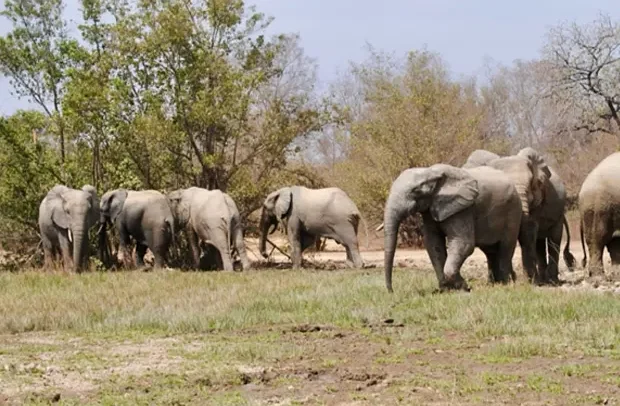The Mole National Park, located in the Savannah Region of the country is Ghana’s first, largest and most prestigious protected area which is home to different species of wildlife.
The Mole National Park, known for its elephant herds, antelopes, and exotic bird species is the largest and covers about 4,577 kilometers.
However, poaching activities at the park is causing a decline and extinction of the species.
The park authorities are worried that the poaching activities could affect the number of visitors to the park and by extension affect revenue generation.
Poachers after illegally capturing these species sell them to food vendors in the community without verifying the health condition which poses health danger and can spread diseases from the animals to humans who consume it.
Again, activities of poachers lead to deforestation that causes reduction in the planet’s ability to sequester carbon leading to climate change.
Ali Mahama
Speaking with DAILY GUIDE, the Mole National Park Manager, Ali Mahama, said poaching is one of the challenges the park is face.
“The park has adopted a range system and the continuous patrol of the park to ensure that illegal wildlife crimes are tackled as well as going through the legal process to prosecute offenders to serve as deterrent to anybody who tries to come into the park to poach,” he said.
According to him, the continuous poaching activities in the park affects biodiversity negatively.
“We work in collaboration with the Ghana police service to prosecute poachers. Most of the cases that go to court results in the offenders being punished with a fine due to the new Wildlife Act, 2023 (Act 1115),” he said.
He, however, lamented the lack of adequate staff at the Mole National Park and appealed to the government to come to their aid.
“We call on the government to assist us to recruit more staff to boost the number of staff currently working because it’s very critical for the kind of work load at the park. We are currently leveraging on technology to help us to monitor the park and this helps us to arrest wildlife offenders,” he said.
Mr. Mahama, commended the World Bank in collaboration with the government for supporting the park with the Earth Ranger System to assist in monitoring.
“It’s a very good device that the park uses to monitor biodiversity and gives us real time monitoring and the staff communicates directly with the control room and this is a game changer for us because the staff safety at the field is enhanced. Most of the areas in the park does not have network and because of the Earth Ranger System staff are able to collect data,” he added.
The Mole National Park Manager, called on the government to help open up the park to generate more revenue for the country.
He said the Mole National Park is a great potential for the government and, “we can make a lot of revenue from the park while we are conserving and protecting the biodiversity we have in the park. We just have about 20% of the park having access road and we have a lot of resources and attractions in the park that are not yet exploited and once we are able to open up this place it will definitely increase the number of visitors we are going to have in the park.”
Patience Tettehdzi
Tourism Potential
Tourism officer for the Mole National Park, Patience Tettehdzi, in an interview with DAILY GUIDE, disclosed that in 2023, the park recorded 18,600 visitors and that about 70% were domestic tourist. The number grew to 23,900 visitors with about 65% being domestic tourist in 2024.
She urged Ghanaians to patronise their own as well as extended an invitation to others to visit the Park.
She indicated that the Mole National Park is unique due to its diverse biodiversity and urged researchers to come to the Park for their various research works.
“For the birds’ lover, Mole National Park is a safe haven for birds and if you want a place to do your birds’ research or tourism, the Mole National Park is the best place to be,” she said.
The Tourism Officer for the Mole National Park, appealed to the Minister of Education to include a subject related to conservation to the curriculum for basic schools in the country.
“I will suggest or recommend that a subject related to conservation should be added to the curriculum because once you start with the students at their age they grow with it,” she appealed.
FROM Eric Kombat, Damongo


